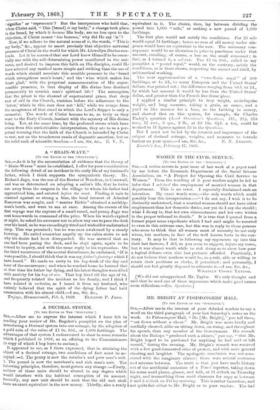A "BRAIN-WAVE."
[TO THE EDITOR OF THE "SPECTATOR.']
Sin,—As it is by the accumulation of evidence that the theory of " Brain-Waves " must be established, I offer for your consideration the following detail of an incident in the early life of my husband's father, which I think supports the sympathetic theory. Ile, Richard Jago, was the son of the Rector of Wendron, in Cornwall, and was so determined on adopting a sailor's life, that he twice ran away from the surgeon in the village to whom his father had apprenticed him, and entered before the mast. Finding it vain to contend against so strong a bias, the local interest of Admiral Boscowen was sought, and "master Richie" obtained a midshipman's berth, and went to sea at once. Among the events of his first voyage was the capture of a small vessel, and young Jago was sent homewards in command of the prize. When his watch expired at night, he asked his successor not to allow any one to pace the deck over his head, as he was exceedingly tired and wished for undisturbed sleep. This was promised ; but he was soon awakened by a steady footstep. He called somewhat angrily up the cabin stairs to ask why his desire had been disregarded. He was assured that no one had been pacing the deck, and he slept again, again to be roused to inquiry, and with the same reply to his reproaches. On the third recurrence of the mental disturbance, he exclaimed, "If it were possible, I should think that it was my father's footsteps which I have heard." He made an entry in his log-book of the day and hour of the occurrence ; and when he reached home he learned that at that time his father lay dying, and his latest thoughts were filled with anxiety for his boy at sea. That boy lived till the age of 84, and frequently related the incident to his family, and I think I have related it verbatim, as I heard it from my husband, who entirely believed that the spirit of the dying father had held communion with his absent child.—I am, Sir, &c., Trejago, Hammersmith, Feb. 5, 1869. ELEANOR P. JAG°.


































 Previous page
Previous page